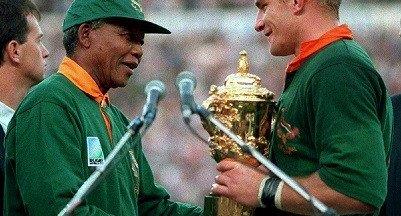AFRICAN WAY
Published on Linkedin on June 22, 2017
On April Fool’s Day 2017, with the fall of the Treasury, South Africa finally became the
fifty fourth country on the African Continent to succumb.....
.............to the 'African Way'. This is not surprising when you read extracts from
William Woodruff’s ‘A Concise History of the Modern World’ and specifically the chapter
‘The Decolonization of Africa’.
William Woodruff is Graduate Research Professor (Emeritus) in Economic History at
the University of Florida, Gainesville. He holds degrees from the Universities of Oxford,
London, Nottingham and Melbourne (honorary).
He says ‘The declaration of principles by Churchill and Roosevelt in the Atlantic Charter
in 1941, with its promise of self-determination and self-government for all, heralded
the end of European colonization in Africa. As the Second World War progressed, a
new generation of black leaders, intent on obtaining self-rule, emerged out of the
native resistance movements’.
81
SINKING OF A NATION
‘By and large, the European nations were as glad to surrender political power as the
native leaders were to assume it. When one compares the struggle for independence
in Asia, African independence – except for Algeria – was won quietly and with relatively
little bloodshed; in some cases, it was thrust upon those who sought it’.
‘When one considers African traditions, and the desperate economic conditions of so
many Africans, it was perhaps foolish to have expected Africa to adopt Western ways.
With a tradition of hierarchical tribalism, Africa has never been disposed to democratic
politics. While the number of democracies in the world is on the rise, Africa was not
much closer to democratic rule in 2005 than it was in 1950. What the West
understands as freedom of the individual under the law has still to be achieved. Where
the rule of law has gained a foothold, it has often been broken by democratic leaders’.
‘In many African countries, free elections and a free press (as the West would define
them) are not tolerated; nor is an independent judiciary.
The Western idea of freely held multi-party elections is not widespread. Too many
governments do not have a ‘loyal opposition’; they have political enemies. Elections
are a means of conserving power, not introducing democracy. In a continent where
power is personalized, few presidents have ever accepted defeat in an election.
Concentrated rather than shared, power is the ‘African Way’.
‘Having removed the colonial yoke, Africans now bear a yolk of their own making’.
‘Independence from colonial powers has not only brought widespread violence; it has
brought a deterioration of Africa’s economic lot. It is the world’s poorest, most
indebted continent; the debt repayments of some countries exceed the amount being
spent on health and education’.
‘By holding the West responsible for the continent’s extreme poverty, internal wars,
tribalism, fatalism and irrationality, autocracy, disregard for the future, stifling of
individual initiative, military vandalism, staggering corruption, mismanagement and
sheer incompetence, Africans are indulging in an act of self-deception’
82
SINKING OF A NATION
‘A similar colonial background has not prevented certain Asian countries from
achieving rapid economic development. Africa cannot hope to escape from its present
economic and political dilemmas by placing the blame on others’
‘If Africa is to pay a necessary and constructive role in the world community, it must
first rediscover itself. Only Africans really know where they have been and where they
might hope to go. They do not have to have Western values and Western goals to
become economically viable; their cultural values are too deeply planted for that to
happen. Western values and goals may be entirely inappropriate for them. Nor does
their performance need to be judged by Western standards. Ultimately, African
intrinsic values and goals must prevail. African ideas, confidence and resolve, rather
than foreign leadership and foreign aid - much though it is needed – will eventually
determine Africa’s future. The continent’s human qualities and its rich natural
resources offer great hope’.
83





